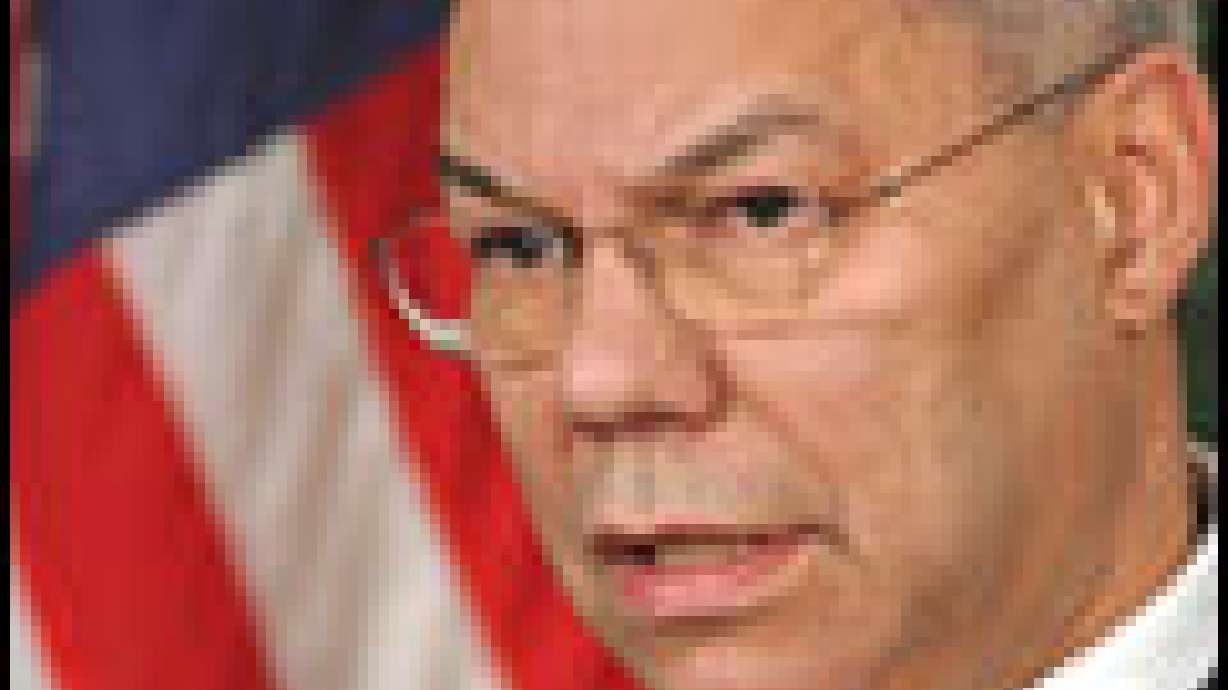Estimated read time: 4-5 minutes
This archived news story is available only for your personal, non-commercial use. Information in the story may be outdated or superseded by additional information. Reading or replaying the story in its archived form does not constitute a republication of the story.
BEIRUT, Lebanon (AP) - Secretary of State Colin Powell on Saturday outlined for Syria's president the policy changes the United States believes he must make to survive alongside a post-Saddam Hussein Iraq that has friends in Washington.
Powell and Bashar Assad met for three hours in Damascus, Syria's capital, and Powell left immediately for Beirut to try to sell Lebanon on the U.S.-sponsored "road map" for peace between Israel and the Palestinians. Burned once before by ignored promises from Syria about its access to Iraqi oil, Powell would not read glimmers of hope into the signals he got from Assad.
He said in a Beirut news conference that he and Assad discussed "all of the outstanding issues" that have thwarted U.S.-Syrian relations in the past and, especially, in the past two months during the military campaign in Iraq.
That included frank talk about weapons of mass destruction; Syria's support for the Lebanese militant group Hezbollah; and closing the Iraq-Syria border "and keeping it sealed" to technology, fighters and wanted Iraqi authority figures, Powell said. Indulging such activity is no longer an option, he said, now that Iraqi President Saddam is gone from power and will be replaced by a government with vastly improved relations with the United States.
Powell said the United States is not looking to pressure Syria with military action in the new post-Iraq war reality. "I am here to pursue diplomacy and mutual political efforts that both sides can be taking," he said. "So the issue of war hostilities is not on the table."
Assad "said he wishes to consider these points of view that I presented, and we will be following up in ... diplomatic channels," Powell said. He also said Syria indicated it had closed certain Palestinian offices in Damascus; Powell had been expected to bring up the offices kept in Syria by groups such as the militant Hamas and Islamic Jihad, which the Bush administration classifies as terrorist organizations.
"They did closures. I expect them to do more, with respect to access and appearances of various officials in those organizations," Powell said. "We provided some other suggestions to the Syrians that they are going to take in advisement. I expect to hear back."
A senior State Department official who attended the meeting said Powell explained to Assad that the United States could not understand why those groups, their leaders and their presence were seen "as of any benefit to Syria any longer" in the new strategic climate that followed Saddam's fall.
The official, speaking on condition of anonymity, said Powell specifically mentioned three groups _ Hamas, the Palestinian Islamic Jihad and the Popular Front for the Liberation of Palestine, General Command _ and quoted Powell as saying the United States will watch closely to determine whether the offices are indeed closed. The official said Powell added that the United States would take that as a sign of whether Syria really wants a new relationship with the United States "on a new foundation, not just some incrementalism from the past."
A member of Islamic Jihad's politburo in Damascus, Ziad Naghalah, told The Associated Press Saturday night that his group had heard nothing form the government about closing down. Hamas officials in Damascus were unavailable.
For his part, Powell said he made clear that the U.S. commitment to Middle East peace "would include Syria and Lebanon, and would include the Golan Heights," a particularly sensitive issue for Syria. The Golan Heights are a rocky frontier plateau held by Israel since the 1967 Middle East War.
In Beirut, Powell assured Prime Minister Rafik Hariri of U.S. support for "an independent and prosperous Lebanon free of all _ all _ foreign forces." As he did with Syria, he emphasized the Israeli-Palestinian "road map" is envisioned as the path to a settlement that also includes the interests of Syria and Lebanon.
"We are interested in a comprehensive solution that will involve creation of a Palestinian state and settling the outstanding issues between Israel and Lebanon, and Israel and Syria," Powell said.
Foreign Minister Jean Obeid, at the news conference with Powell, said Syria and Lebanon suffered also from war and violence fomented by Saddam.
"We do not want the suffering to continue after his collapse as they were under his dictatorship," Obeid said. "We want to live together, Arabs, Israelis and Christians, Muslims, in peace, and not to die together in wars."
Powell made the trip to help sell the blueprint for getting Israelis and Palestinians back into peace negotiations and out of a deadly imbroglio that has dragged on for more than two years and claimed many, many lives. The secretary will return to the region next week to see Israeli Prime Minister Ariel Sharon and Mahmoud Abbas, the new Palestinian prime minister.
(Copyright 2003 The Associated Press. All rights reserved.)









